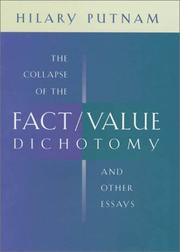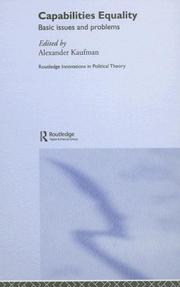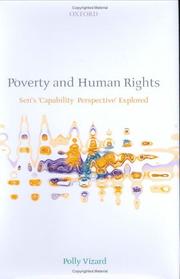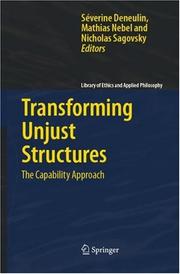| Listing 1 - 10 of 17 | << page >> |
Sort by
|
Book
ISBN: 0429581688 0429198949 0429583583 9780429583582 9780429198946 9780429579462 0429579462 9780429581687 0367188740 9780367188740 9780367776909 Year: 2019 Publisher: Milton : Routledge,
Abstract | Keywords | Export | Availability | Bookmark
 Loading...
Loading...Choose an application
- Reference Manager
- EndNote
- RefWorks (Direct export to RefWorks)
Are human beings motivated exclusively by self-interest? The orthodox theory of rational choice in economics thinks that they are. Amartya Sen disagrees, and his concept commitment is central to his vision of an alternative to mainstream rational choice theory. This book examines commitment as it has evolved in Sen's critique of orthodox rational choice theory. The in-depth focus on commitment reveals subtleties in the concept itself as well as in its relationships with other concepts which Sen develops in his critique of rational choice theory,for examplepreference, sympathy, weakness of will, agency, personhood, social norms, rights, self-welfare goal and self-goal choice. The book provides a comprehensive understanding of commitment and offers novel interpretations of the term as a way of strengthening its plausibility. Broadly in support of Sen's conceptualization of rational choice, the book nevertheless reveals ambiguities and weaknesses in Sen's conceptual framework, and it reformulates Sen's concepts when doing so strengthens the claims he makes. The book also engages with critics of Sen and argues for the importance of commitment as a component in the theory of rational choice.
Economics --- Rational choice theory. --- Social choice --- Behavioral economics --- Behavioural economics --- Psychological aspects. --- Sen, Amartya, --- Amadiya Sen, --- Amartya Kumar Sen, --- Amartya Sen, --- Amartya Sena, --- ʻAmāttaya Sen, --- Sen, A. K. --- Sen, Amadiya, --- Sen, Amarty K. --- Sen, Amartya K. --- Sen, Amartya Kumar --- Sen, Amartya Kumar, --- Sen, Armatya, --- Sena, Amartya, --- 阿瑪蒂亚・森, --- Methodology of economics --- Sen, Amartya
Book
ISBN: 1003121535 1000422461 9781003121534 9781000421712 1000421716 9781000422467 9780367639617 9780367639631 0367639610 Year: 2021 Publisher: London ; New York, New York : Routledge,
Abstract | Keywords | Export | Availability | Bookmark
 Loading...
Loading...Choose an application
- Reference Manager
- EndNote
- RefWorks (Direct export to RefWorks)
Catholic Church --- Christian sociology --- Doctrines. --- Catholic Church. --- Sen, Amartya, --- Catholic social teaching --- CST (Theology) --- Social teaching, Catholic --- Sociology, Christian (Catholic) --- Amadiya Sen, --- Amartya Kumar Sen, --- Amartya Sen, --- Amartya Sena, --- ʻAmāttaya Sen, --- Sen, A. K. --- Sen, Amadiya, --- Sen, Amarty K. --- Sen, Amartya K. --- Sen, Amartya Kumar --- Sen, Amartya Kumar, --- Sen, Armatya, --- Sena, Amartya, --- 阿瑪蒂亚・森,
Multi
ISBN: 9021462109 Year: 2000 Publisher: Amsterdam Em. Querido's Uitgeverij
Abstract | Keywords | Export | Availability | Bookmark
 Loading...
Loading...Choose an application
- Reference Manager
- EndNote
- RefWorks (Direct export to RefWorks)
Philosophy of science
---
Dutch literature
---
Economics
---
Moral and ethical aspects.
---
-#BIBC:ruil

ISBN: 0674009053 0674013808 9780674009059 9780674013803 Year: 2002 Publisher: Cambridge (Mass.) : Harvard university press,
Abstract | Keywords | Export | Availability | Bookmark
 Loading...
Loading...Choose an application
- Reference Manager
- EndNote
- RefWorks (Direct export to RefWorks)
Philosophy of science --- General ethics --- Values. --- Facts (Philosophy) --- Welfare economics --- Valeurs (Philosophie) --- Faits (Philosophie) --- Economie du bien-être --- Philosophy --- Philosophie --- Sen, Amartya, --- Welfare economics. --- Values --- Economic policy --- Economics --- Social policy --- Axiology --- Worth --- Aesthetics --- Knowledge, Theory of --- Metaphysics --- Psychology --- Ethics --- Experience --- Sen, Amartya Kumar --- Sen, Amartya Kumar, --- Amartya Sen, --- Amartya Kumar Sen, --- Sena, Amartya, --- Amartya Sena, --- Sen, A. K. --- Sen, Amartya K. --- ʻAmāttaya Sen, --- Sen, Armatya, --- Sen, Amarty K. --- Sen, Amadiya, --- Amadiya Sen, --- 阿瑪蒂亚・森, --- Facts (Philosophy). --- Economie du bien-être
Book
ISBN: 1612093620 9781612093628 1616685085 9781616685089 Year: 2010 Publisher: New York
Abstract | Keywords | Export | Availability | Bookmark
 Loading...
Loading...Choose an application
- Reference Manager
- EndNote
- RefWorks (Direct export to RefWorks)
Welfare economics. --- Economic development --- Institutional economics. --- Economics --- Economic policy --- Social policy --- Social aspects. --- Sen, Amartya, --- Amadiya Sen, --- Amartya Kumar Sen, --- Amartya Sen, --- Amartya Sena, --- ʻAmāttaya Sen, --- Sen, A. K. --- Sen, Amadiya, --- Sen, Amarty K. --- Sen, Amartya K. --- Sen, Amartya Kumar --- Sen, Amartya Kumar, --- Sen, Armatya, --- Sena, Amartya, --- 阿瑪蒂亚・森, --- Criticism and interpretation. --- Welfare economics --- Institutional economics --- Capabilities approach (Social sciences) --- Capability approach (Social sciences) --- Social sciences --- Social aspects --- E-books

ISBN: 1134236859 1281158232 9786611158231 0203799445 9780203799444 0415360552 9781134236800 9781134236848 9781134236855 9780415360555 9780415499781 Year: 2006 Publisher: New York London Routledge
Abstract | Keywords | Export | Availability | Bookmark
 Loading...
Loading...Choose an application
- Reference Manager
- EndNote
- RefWorks (Direct export to RefWorks)
The capabilities approach to equality, developed by Amartyr Sen and Martha Nussbaum, seeks to answer the question: what is a proper measure of a person's condition for the purposes of determining what we owe each other, as a matter of justice? While the capabilities theory has avoided many of the conceptual difficulties that have undermined competing accounts of egalitarian justice, recent criticisms have raised questions regarding the focus, structure and justification of the theory. In this volume, leading scholars present new and original essays that address these controversies. <
Social justice. --- Distributive justice. --- Equality. --- Egalitarianism --- Inequality --- Social equality --- Social inequality --- Political science --- Sociology --- Democracy --- Liberty --- Distribution (Economic theory) --- Justice --- Social justice --- Wealth --- Equality --- Moral and ethical aspects --- Sen, Amartya, --- Amadiya Sen, --- Amartya Kumar Sen, --- Amartya Sen, --- Amartya Sena, --- ʻAmāttaya Sen, --- Sen, A. K. --- Sen, Amadiya, --- Sen, Amarty K. --- Sen, Amartya K. --- Sen, Amartya Kumar --- Sen, Amartya Kumar, --- Sen, Armatya, --- Sena, Amartya, --- 阿瑪蒂亚・森, --- Ethiek. --- Overheidsmanagement.

ISBN: 9780199273874 0199273871 0191699713 1429422041 1280755229 0191515221 9780191699719 9780191515224 Year: 2006 Publisher: Oxford : Oxford university press,
Abstract | Keywords | Export | Availability | Bookmark
 Loading...
Loading...Choose an application
- Reference Manager
- EndNote
- RefWorks (Direct export to RefWorks)
This book provides a major new cross-disciplinary framework for thinking about poverty and human rights. Drawing on the fields of ethics, economics, and international law, Vizard demonstrates how the work of Nobel Laureate Amartya Sen has expanded and deepened human rights discourse across traditional disciplinary divides. - ;'Poverty itself is a violation of numerous basic human rights.' (Mary Robinson, former UN High Commissioner on Human Rights) The idea that freedom from poverty is a basic human right that gives rise to moral and legal obligations of governments and other actors has receiv
Human rights. --- Poverty --- Economics --- International cooperation. --- Moral and ethical aspects. --- Sen, Amartya, --- Influence. --- Economic theory --- Political economy --- Social sciences --- Economic man --- Basic rights --- Civil rights (International law) --- Human rights --- Rights, Human --- Rights of man --- Human security --- Transitional justice --- Truth commissions --- Law and legislation --- Amadiya Sen, --- Amartya Kumar Sen, --- Amartya Sen, --- Amartya Sena, --- ʻAmāttaya Sen, --- Sen, A. K. --- Sen, Amadiya, --- Sen, Amarty K. --- Sen, Amartya K. --- Sen, Amartya Kumar --- Sen, Amartya Kumar, --- Sen, Armatya, --- Sena, Amartya, --- 阿瑪蒂亚・森, --- Poverty - International cooperation. --- Economics - Moral and ethical aspects.
Multi
ISBN: 9780521852913 9780521618069 9780511800511 9780511651991 0511651996 0521852919 0521618061 0511800517 1107209900 051169976X 1282393952 9786612393952 0511647913 0511633041 0511631839 0511634250 Year: 2009 Publisher: Cambridge New York Cambridge University Press
Abstract | Keywords | Export | Availability | Bookmark
 Loading...
Loading...Choose an application
- Reference Manager
- EndNote
- RefWorks (Direct export to RefWorks)
Amartya Sen was awarded the Nobel Memorial Prize in Economics in 1998 'for his contributions in welfare economics'. Although his primary academic appointments have been mostly in economics, Sen is also an important and influential social theorist and philosopher. His work on social choice theory is seminal, and his writings on poverty, famine, and development, as well his contributions to moral and political philosophy, are important and influential. Sen's views about the nature and primacy of liberty also make him a major contemporary liberal thinker. This volume of essays on aspects of Sen's work is aimed at a broad audience of readers interested in social theory, political philosophy, ethics, public policy, welfare economics, the theory of rational choice, poverty, and development. Written by a team of well-known experts, each chapter provides an overview of Sen's work in a particular area and a critical assessment of his contributions to the field.
Economics. --- Social sciences --- Philosophy. --- Sen, Amartya, --- Verband tussen de ethiek en de economie. Ethiek en bedrijf. --- Economics --- 08 --- 174 --- 313 --- 330.580 --- AA / International- internationaal --- Social philosophy --- Social theory --- Economic theory --- Political economy --- Economic man --- Philosophy --- Biografieën en memoires --- Verband tussen de ethiek en de economie. Ethiek en bedrijf --- Levenswijze en levensstandaard. Levensminimum. sociale indicatoren (Studiën) --- Gecontroleerde economie. Geleide economie. Welvaarststaat. Algemeenheden --- Sen, Amartya Kumar --- Sen, Amartya Kumar, --- Amartya Sen, --- Amartya Kumar Sen, --- Sena, Amartya, --- Amartya Sena, --- Sen, A. K. --- Sen, Amartya K. --- ʻAmāttaya Sen, --- Sen, Armatya, --- Sen, Amarty K. --- Sen, Amadiya, --- Amadiya Sen, --- 阿瑪蒂亚・森, --- Sen, Amartya --- Arts and Humanities

ISBN: 0415360552 Year: 2006 Publisher: New York Routledge
Abstract | Keywords | Export | Availability | Bookmark
 Loading...
Loading...Choose an application
- Reference Manager
- EndNote
- RefWorks (Direct export to RefWorks)
Distributive justice --- Equality --- Social justice --- #SBIB:17H20 --- #SBIB:17H3 --- #SBIB:321H30 --- Justice --- Egalitarianism --- Inequality --- Social equality --- Social inequality --- Political science --- Sociology --- Democracy --- Liberty --- Distribution (Economic theory) --- Wealth --- Sociale wijsbegeerte: algemeen --- Politieke wijsbegeerte --- Hedendaagse politieke en sociale theorieën (vanaf de 19de eeuw): algemeen (incl. utilitarisme, burgerschap) --- Moral and ethical aspects --- Sen, Amartya, --- Amadiya Sen, --- Amartya Kumar Sen, --- Amartya Sen, --- Amartya Sena, --- ʻAmāttaya Sen, --- Sen, A. K. --- Sen, Amadiya, --- Sen, Amarty K. --- Sen, Amartya K. --- Sen, Amartya Kumar --- Sen, Amartya Kumar, --- Sen, Armatya, --- Sena, Amartya, --- 阿瑪蒂亚・森, --- Political philosophy. Social philosophy --- Social ethics --- Methodology of economics --- Legal theory and methods. Philosophy of law

ISBN: 1280625007 9786610625000 1402044321 1402044313 9781402044311 9781402044328 904817127X 9789048171279 Year: 2006 Volume: 19 Publisher: Dordrecht Springer
Abstract | Keywords | Export | Availability | Bookmark
 Loading...
Loading...Choose an application
- Reference Manager
- EndNote
- RefWorks (Direct export to RefWorks)
The "capability approach" of development economist Amartya Sen, who received the Nobel Prize for Economics in 1998, poses a major challenge to the dominant paradigm of neo-classical economics. According to Sen, human well-being does not depend on the consumption of commodities but on the freedoms human beings have reason to choose and value. The capability approach has frequently been criticised for a lack of attention to the ways in which unjust social, political and economic structures restrict human capabilities. The contributors to this volume take up this criticism in a number of ways, both theoretical and practical. The theoretical discussion engages with the thought of Sen himself and with the hermeneutical tradition represented by Paul Ricoeur. The practical discussion consists of five case studies examining the effectiveness of the capability approach in dealing with cases of structural injustice. These cover: racism in South Africa; access to labour markets in Europe; participation in higher education in the UK; poverty and welfare reforms in the US; and biotechnology patents. How effectively, ask all the contributors, can Sen’s capability approach be deployed in the transformation of unjust structures?
Philosophy. --- Ethics. --- Political philosophy. --- Social sciences. --- Political Philosophy. --- Social Sciences, general. --- Developing countries --- Politics and government. --- Economic development --- Social justice --- Welfare economics --- 241.65 --- Economic policy --- Economics --- Social policy --- Equality --- Justice --- 241.65 Theologische ethiek: rechtvaardigheid--(zie ook {330.86}) --- Theologische ethiek: rechtvaardigheid--(zie ook {330.86}) --- Political aspects --- Sen, Amartya, --- Amadiya Sen, --- Amartya Kumar Sen, --- Amartya Sen, --- Amartya Sena, --- ʻAmāttaya Sen, --- Sen, A. K. --- Sen, Amadiya, --- Sen, Amarty K. --- Sen, Amartya K. --- Sen, Amartya Kumar --- Sen, Amartya Kumar, --- Sen, Armatya, --- Sena, Amartya, --- 阿瑪蒂亚・森, --- Social justice. --- Welfare economics. --- Political aspects. --- Criticism and interpretation. --- Développement économique --- Einkommensverteilung. --- Entwicklungsländer. --- Gerechtigkeit. --- Justice sociale. --- Lebensqualität. --- Politik. --- Soziale Gerechtigkeit. --- Sozialethik. --- Wirtschaftsentwicklung. --- Aspect politique. --- Sen, Amartya Kumar. --- Critique et interprétation. --- Developing countries. --- Pays en voie de développement --- Politique et gouvernement. --- Capabilities approach (Social sciences) --- Politics and government --- Social change --- Social ethics --- Political philosophy. Social philosophy --- Microeconomics --- Economic development - Political aspects --- Sen, Amartya, - 1933 --- -Developing countries - Politics and government --- Developing countries - Politics and government --- -Developing countries
| Listing 1 - 10 of 17 | << page >> |
Sort by
|

 Search
Search Feedback
Feedback About UniCat
About UniCat  Help
Help News
News